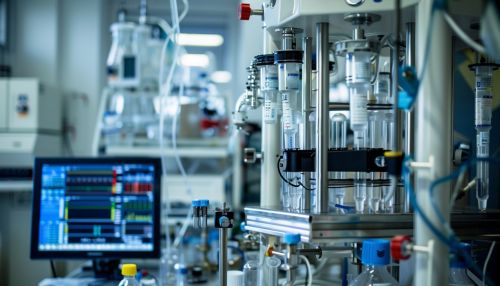Bioreactor
Introduction
A bioreactor is a device or system engineered to support biologically active environments. It is used in various fields such as biotechnology, pharmaceutical industry, and environmental engineering to cultivate organisms. Bioreactors are vital in the production of biochemically active substances through the growth of bacteria, yeast, animal cells, or plant cells.


Types of Bioreactors
Bioreactors can be classified into different types based on their design and functionality.
Stirred Tank Bioreactors
Stirred tank bioreactors are the most common type of bioreactor due to their flexibility in operation. They consist of a cylindrical vessel with a stirrer that provides mixing and aeration.
Airlift Bioreactors
Airlift bioreactors are another type of bioreactor that uses air or gas to circulate the medium and maintain the cells in suspension.
Packed Bed Bioreactors
Packed bed bioreactors contain a packed bed of immobilized cells or enzymes. The substrate is passed over the packed bed, and the product is collected at the outlet.
Fluidized Bed Bioreactors
In fluidized bed bioreactors, the cells or particles are suspended in a liquid medium by an upward flow of fluid.
Operation of Bioreactors
The operation of a bioreactor involves several steps, including sterilization, inoculation, fermentation, and product recovery.
Sterilization
Sterilization is the first step in the operation of a bioreactor. It involves the elimination of all forms of life, including spores, from the bioreactor and the medium.
Inoculation
Inoculation involves the introduction of a small volume of microbial culture into the sterile medium in the bioreactor.
Fermentation
Fermentation is the process where the inoculated microorganisms grow and multiply in the bioreactor, converting the substrate into the desired product.
Product Recovery
Product recovery is the final step in the operation of a bioreactor. It involves the separation and purification of the product from the fermentation broth.
Applications of Bioreactors
Bioreactors have a wide range of applications in various fields.
Biotechnology
In biotechnology, bioreactors are used for the production of biopharmaceuticals, biofuels, and other bio-based products.
Pharmaceutical Industry
In the pharmaceutical industry, bioreactors are used for the production of antibiotics, vaccines, and other therapeutic proteins.
Environmental Engineering
In environmental engineering, bioreactors are used for the treatment of wastewater and the production of renewable energy.
